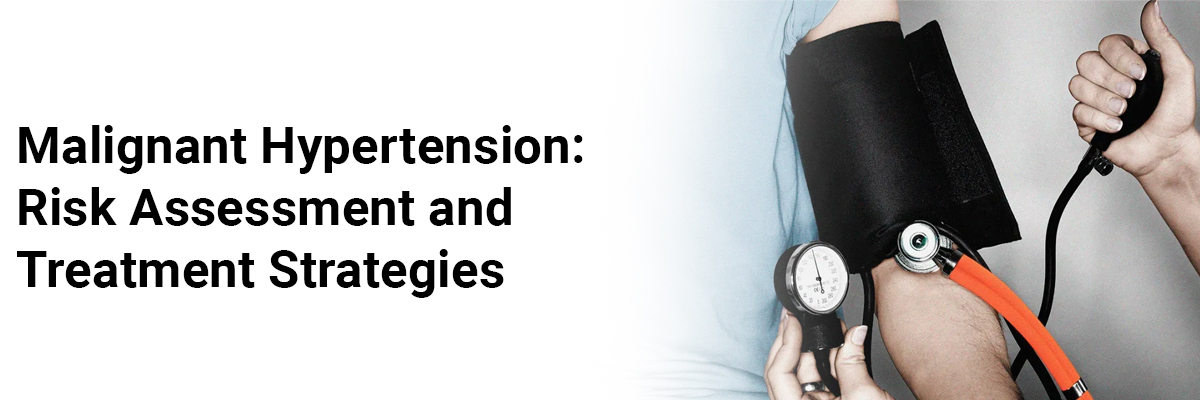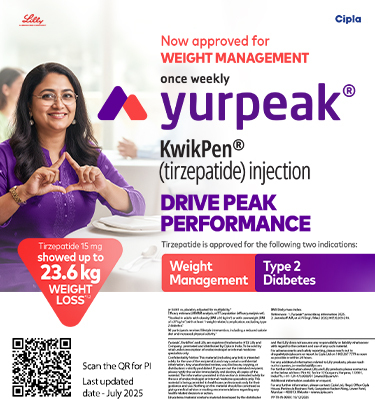
 Mrs. Mayuri Mathur
Mrs. Mayuri Mathur
Malignant Hypertension: Risk Assessment and Treatment Strategies
Malignant hypertension, or hypertensive crisis, is a life-threatening condition characterized by extremely high blood pressure levels. It represents a medical emergency requiring immediate evaluation and treatment to prevent severe complications and organ damage.
Malignant hypertension is a rare but severe form of hypertension typically occurring in individuals with pre-existing hypertension that has been poorly controlled or undiagnosed. The exact cause of malignant hypertension is not fully understood; still, it is believed to result from abnormalities in the regulation of blood vessel tone and function, leading to widespread vasoconstriction and impaired organ perfusion.
There are two types of malignant hypertension:
1. Hypertensive emergency: This occurs when blood pressure rises, accompanied by signs of organ damage. It is considered a medical emergency and requires immediate medical attention.
2. Hypertensive urgency: In this case, blood pressure is abnormally high, but there are no signs of organ damage.
Causes and Symptoms
The leading cause of malignant hypertension is uncontrolled high blood pressure. Other factors contributing to its development include:
• Adrenal disorders.
• Central nervous system disorders.
• Drugs and medications.
• Renal artery disease.
• Structural heart disease.
• Thyroid disorders.
• Substance and medication withdrawal.
The malignant hypertension symptoms vary depending on which organs are affected and may include chest pain, decreased urine output, delirium, headaches, lower back pain, mood changes, nausea and vomiting, shortness of breath, vision changes, confusion, seizures, and neurological deficits. These symptoms arise from acute damage to vital organs, including the brain, heart, kidneys, and eyes.
Diagnostic Strategies
Diagnosing malignant hypertension involves measuring blood pressure, usually with values consistently exceeding 180/120 mmHg, in addition to evidence of acute end-organ damage. There is no specific blood pressure reading used to diagnose malignant hypertension. To diagnose malignant hypertension, healthcare providers perform a comprehensive assessment, which may also include tests such as eye exams, neurologic exams, physical exams, and toxicology studies. Diagnostic tests may include blood and urine tests to assess organ function, electrocardiography (ECG) to evaluate heart abnormalities, and imaging studies to detect organ damage.
Treatment and Management
Immediate medical intervention is crucial in managing malignant hypertension to prevent further organ damage and life-threatening complications. The primary goal of treatment is to rapidly lower blood pressure to safe levels while avoiding excessively rapid reduction that may lead to ischemic events.
The treatment modalities of hypertensive emergencies depend on the specific situation and the organs affected. It's important not to lower blood pressure too quickly or too much, as it can cause damage in areas that have adapted to the high pressure. However, in most cases, the goal is to reduce the mean arterial pressure (MAP) by about 10 to 20% within the first hour and then by an additional 5% to 15% over the next 24 hours. However, there are a few exceptions where blood pressure needs to be lowered more rapidly.
Treatment for a hypertensive emergency involves immediate care in an emergency room, where special medications are administered intravenously to lower blood pressure. Hospitalization is required until blood pressure reaches a safe range, after which oral blood pressure medications are continued. After a period of controlled blood pressure, usually lasting 8 to 24 hours, oral medications are typically prescribed, and the intravenous therapy is gradually reduced and stopped.
Hypertensive urgency, on the other hand, does not require inpatient care or intravenous medications. Blood pressure medications are taken orally to gradually decrease blood pressure to a safe range. Commonly used intravenous medications for treating hypertensive emergencies include:
• Nicardipine
• Sodium nitroprusside
• Labetalol
• Esmolol
If blood pressure measurements using cuffs are not precise enough or if there is life-threatening organ damage, arterial catheterization may be considered for more accurate and frequent blood pressure measurements.
Clinical Complications Associated with Malignant Hypertension
The short-term outlook for people with malignant hypertension is generally good if they receive timely care. Emergency treatments are often successful, but there is still a risk of complications.
Potential complications include aortic dissection, acute heart failure, acute kidney injury, brain damage, heart attack, hemorrhage, stroke, unstable angina, and vision loss. Even though hypertensive urgency may not cause organ damage, it is essential to treat it because individuals with this condition often have risk factors that increase the likelihood of future organ damage, such as diabetes, history of heart disease, obesity, tobacco use, and uncontrolled high blood pressure.
Preventive Measures
Prevention of malignant hypertension involves:
• Taking prescribed blood pressure medications.
• Addressing challenges with daily medication use.
• Attending routine physical exams and specialist visits.
• Managing other medical conditions like diabetes.
Both types of malignant hypertension require close monitoring and follow-up appointments to ensure blood pressure remains under control and does not lead to clinical adversities.
In addition, adopting a healthy lifestyle, including maintaining a healthy weight, managing stress effectively, quitting smoking, and consuming a balanced diet low in sodium and saturated fats, can help reduce the risk of recurrence and associated complications.
Conclusion
Malignant hypertension is a severe hypertensive emergency requiring immediate medical attention. Recognizing the signs and symptoms, diagnosing the condition promptly, and initiating appropriate treatment is vital in preventing further organ damage and improving patient outcomes. Timely intervention and blood pressure control can help mitigate complications and provide the best chance for recovery. Public awareness, regular blood pressure monitoring, and effective management of hypertension are crucial in preventing the development of malignant hypertension.

Mrs. Mayuri Mathur
Mrs. Mayuri Mathur is a Senior Medical Writer (Patient education and digital) and seasoned content creator with a rich tapestry of expertise spanning over ten years. With a diverse background in content creation, she brings a wealth of experience to the table, from crafting insightful medical articles to developing comprehensive patient education materials, dynamic press releases, and captivating brochures and website content. Throughout her illustrious career, she has demonstrated an exceptional knack for distilling complex medical concepts into easily understandable content, making her a trusted resource for both professionals and lay audiences alike. Her meticulous attention to detail and innate creativity have enabled her to deliver content that not only informs but also engages and inspires. Whether elucidating intricate medical procedures or crafting compelling marketing materials, her versatility and dedication shine through in every project she undertakes. Her passion for writing, coupled with her profound understanding, makes her an invaluable asset to any team or project. In a constantly evolving digital landscape, where effective communication is paramount, Mrs. Mayuri Mathur stands out as a beacon of excellence, consistently delivering top-notch content that resonates with audiences across diverse platforms.

.png)

.png)
.png)


.jpg)








.jpg)


Please login to comment on this article